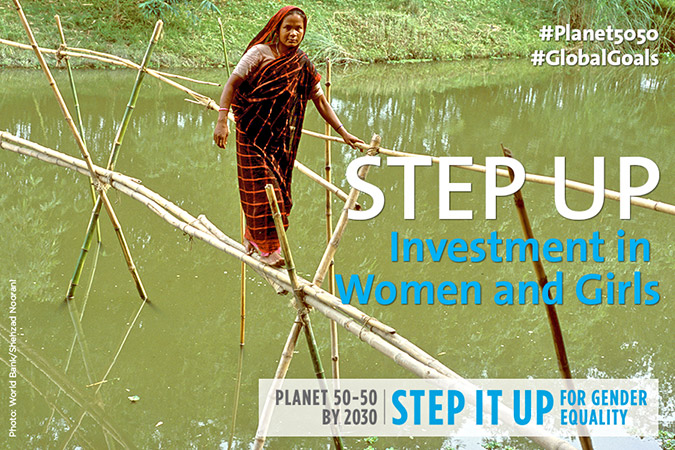Commentary: We can’t step it up on gender equality without stepping up expenditures
Date:
Author: A.H. Monjurul Kabir
United Nations – The theme of International Women’s Day 2016 is, “‘Step it Up for Gender Equality.” Easier said than done. It requires commitment, unity, solidarity, inclusion, change, and often most importantly, adequate financial resources. We simply can’t step it up without closing the gap between how much we are spending and how much we need to spend to achieve the goal.

The problem of financing for UN Sustainable Development Goal No. 5 – gender equality and empowerment of women -- was discussed at the 18-19 February Asia-Pacific Regional Seminar, organized by UN agencies and attended by representatives from governments and civil society groups. The seminar was held to prepare for the 60th Session of the Commission on the Status of Women. I did not have any illusion that I would find the answer to the financing problem at this meeting of experts.
In 2014, Asia-Pacific governments committed to “enhance and diversify the sources of financing for the achievement of gender equality, women’s human rights and the empowerment of women and girls, including through domestic resource mobilization, official development assistance, taxation of financial transactions, private sector investment and the engagement of philanthropic foundations”. This regional commitment was reflected in last year’s 2030 Agenda for Sustainable Development; there, governments stated as a global goal that they “will work for a significant increase in investments to close the gender gap”. This was an important first step.
However, these are political declarations of intent that must be translated into reality. Often, promising policies on gender equality and women’s empowerment founder because governments do not allocate sufficient resources to implement them.

The data clearly indicate that more resources make a big difference. According to the World Bank, between 2002 and 2013, development assistance to advance gender equality increased substantially. Countries on the Development Assistance Committee of the Organization for Economic Cooperation and Development more than tripled such aid, from $8 billion to $28 billion. Much of this financing supported gender equality initiatives in education and health.
Of course, good investments require good data. The Benchmark Study on Gender Equality and the Sustainable Development Goals in Asia and the Pacific, a joint initiative of UN Women and Asian Development Bank, is a step in the right direction. The study will take stock of the availability and comparability of data across the region that are needed to track progress on the gender-related goals. It will guide governments to make the right policies.
There will be significant challenges in data gathering. Many countries collect data on persons with disabilities in censuses and surveys. During 2005-2014, 132 countries collected such data in their censuses, 88 did so in labour force surveys, and 46 in living standard measurement surveys. However, rarely are these data processed and disseminated with disaggregation by sex. Lack of such data arise from a failure to prioritize the collection of the data, but also a lack of resources.
The forthcoming High-level Political Forum will discuss what progress countries are making on the Sustainable Development Goals. The first round of country-by-country reviews will take place in July in New York. This will present an excellent opportunity to examine how these countries are integrating gender concerns in their planning and budgeting.
In adopting the 2030 Agenda for Sustainable Development, governments acknowledged that the “achievement of full human potential and of sustainable development is not possible if one half of humanity continues to be denied its full human rights and opportunities.” In order to give those rights and opportunities to the female half of humanity, we must ensure that proclamations are followed by expenditures commensurate with this great task.
It will be a long walk. But I am more confident than ever that there is now a greater appreciation of the challenges our planet is confronting. And I hope that more people from all parts of society will join in achieving the development goals. We need to walk together, women and men, girls and boys, including those with disabilities and other challenges and vulnerabilities. Only then we can step it up for gender equality.
About the author
Dr. AH Monjurul Kabir is Programme Adviser and Head of the Asia-Pacific Section at UN Women Headquarters in New York. He writes here in his personal capacity. He tweets as @mkabir2011.